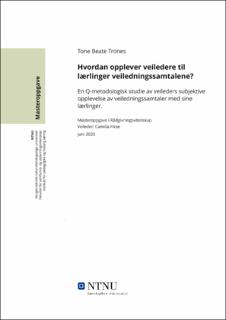| dc.contributor.advisor | Fikse, Camilla | |
| dc.contributor.author | Trones, Tone Beate | |
| dc.date.accessioned | 2021-09-28T17:37:57Z | |
| dc.date.available | 2021-09-28T17:37:57Z | |
| dc.date.issued | 2020 | |
| dc.identifier | no.ntnu:inspera:57984488:28842950 | |
| dc.identifier.uri | https://hdl.handle.net/11250/2784667 | |
| dc.description.abstract | I de siste årene har sentrale myndigheter, sammen med fagfeltet, hatt yrkesfag som et satsningsområde. Norge trenger flere fagarbeidere, og målet har vært å løfte status og få flere ungdommer til å velge yrkesfag. En av nøkkelrollene i fag- og yrkesopplæring er veilederne til de som velger opplæring i bedrift. Det synes å være et fåtall empiriske studier som utforsker hvordan veiledere opplever sitt ansvar og rolle. Denne masteroppgaven kan være et bidrag i denne sammenheng og har søkt å svare på problemstillingen; Hvordan opplever veiledere til lærlinger veiledningssamtalene? I denne sammenheng løftes to forskningsspørsmål frem: Hvordan opplever veilederne å håndtere veiledningssamtalene? Hvordan opplever veilederne sin veiledningskompetanse?
For å svare på problemstillingen og forskningsspørsmålene har jeg utført en Q- metodologisk studie med 31 veiledere for lærlinger innenfor ulike fag i offentlig sektor. For å fange veiledernes subjektive opplevelse gjennomførte alle deltagerne en Q-sortering av 36 utsagn. Disse ble grunnlag for en faktoranalyse, som resulterte i totalt fire faktorsyn som kan gjenspeile ulike opplevelser av veiledningssamtaler blant veilederne som deltok. Faktorsynene ble fortolket og fikk navn ut fra deres hovedmeningsmønster.
Faktorsyn 1: Erfaren og stolt veileder med nærhet til både fag og person.
Faktorsyn 2: Planleggeren som enda ikke identifiserer seg med veilederrollen.
Faktorsyn 3: Trygg og stolt veileder med hovedfokus på kompetansemål.
Faktorsyn 4: Stolt praktiker med fokus på lærlingen og faget.
I drøftingen ser jeg på hvordan faktorsynene kan forstås opp mot relevant teori blant annet innen veiledningskompetanse, selvinnsikt og håndtering av veiledningssamtaler. Disse faktorsynene har til felles at de er alle opptatt av å ivareta trygge rammer for lærlingen, men har ulik opplevelse av hva som er i fokus og hvordan de selv håndterer samtalene. Implikasjoner av studien viser at veilederne er forskjellige og har dermed ulike behov for oppfølging for å kunne oppleve mestring og trygghet i veilederrollen. | |
| dc.description.abstract | In recent years, central authorities, together with the field of study in Norway, have had vocational education as a priority area. Norway is in need for more skilled workers, and the goal has been to elevate the status and make it more attractive for young people to choose a vocational education. One of the key figures in vocational education is the supervisors. They have to assure that the apprentices receive the high quality education they are entitled to. There seem to be few empirical accounts that explore how supervisors perceive their responsibilities. This master’s thesis can hopefully be a contribution as it seeks to answer the research question; How do apprentice supervisors experience the mentoring conversations? Another two research questions are raised to specify even closer: How do supervisors handle the mentoring conversations? How do supervisors experience their mentoring skills?
In order to answer the research questions, I have conducted a Q methodological study with 31 supervisors for apprentices in various vocations in the public sector. In order to capture the subjective experience of the supervisors, all participants completed a Q-sorting of 36 statements. These became the basis for a factor analysis, which resulted in four factor views that reflects different experiences of mentoring conversations among the supervisors who participated. The factor views were interpreted and given names based on their main pattern.
Factor 1: The experienced and proud supervisor with proximity to both subject and person.
Factor 2: The planner who does not yet identify with the supervisor role.
Factor 3: The confident and proud supervisor with main focus on competence aims.
Factor 4: The proud practitioner focusing on the apprentice and the profession.
In the discussion chapter, I look at how the factor views can be understood through relevant theory about supervision and mentoring competence, self-knowledge and how to handle the mentoring conversations. The divergent factor views have in common the desire to maintain a trustworthy and safe environment for the apprentice, even though they have different focal points and experiences of how they handle the mentoring conversations. Implications of the study show that the supervisors have different needs for follow-up and thus requires diverse support in order to encounter the supervisor role and to be confident. | |
| dc.language | | |
| dc.publisher | NTNU | |
| dc.title | Hvordan opplever veiledere til lærlinger veiledningssamtalene? | |
| dc.type | Master thesis | |
